Irish Poetry
 Trinity College,
Dublin
Trinity College,
Dublin
Because of the unique history of Ireland, Irish Poetry always begs the question ‘What makes poetry Irish?’ The genre itself is represented by its historic Gaelic form, as well as the more recent and familiar English variety. The English language poetry of Ireland, at least in its most recent iteration, has been greatly influenced by its Celtic forebear, and the interplay between the two traditions creates a rich and uniquely Irish style.
Irish poetry was historically an oral tradition, especially at a time when few people could read or write. Thus poems were usually short pieces that were easily remembered. In to ensure accurate repetition, oral poets deployed “complicated rhyme schemes that would render a poem nonsensical if any of the key words were changed from the original version.” (extract from Wikipedia)
Poetry in the Irish language dates back to at least the 6th century, perhaps the oldest surviving poetic form in Europe. The more recent English version dates from the 14th century. English language poetry in Ireland did not really absorb specifically Irish themes and Gaelic paradigms until the turn of the 20th Century, during the period of the Celtic revival. This movement sought to sublimate British cultural influences on Irish poetry in favor of more authentically Irish subjects, such as mythology and rural traditions.
W.B. Yeats had a huge impact on Irish writing and was largely responsible for the Celtic Revival. His work frequently focused on expressly Irish topics.
During the past 25 years, Irish poetry took on more universal themes as society became more cosmopolitan and urbanized.
The pantheon of great Irish writers is far too numerous to list here. At My Word Wizard we have begun to explore specifically Irish writings and have assembled a collection of works that track the evolution of the genre. We look forward to adding more to this collection.
We think you will enjoy the wonderful Irish writings contained on these pages.
Taitneamh a bhaint as! (Enjoy)
*Information provided by Wikipedia
Find a Poem From the World's Best Irish Poets
Click below to explore our selection of poetry.
Poems of W.B. Yeats: One of the most imporant and beloved writers in the English language, Yeats was at the forefront of the Celtic Revival movement, which sought to insert Irish themes into English language Irish writing. His early writings were influenced by Celtic mythology. He continued to show an interest in the transcendental throughout his life, but as he grew older his work began to demonstrate a more physical, earthly realism.
Oscar Wilde Poetry: Born in Dublin into a family of intellectuals, Wilde honed his writing style over the course of many years. By the early 1890’s he was one of the most widely celebrated playwrights in London. Apart from his poems and plays, he is perhaps best known for his clever satirical statements as well as his classic novel The Picture of Dorian Gray.
The Works of James Joyce: One of the most influential writers of the 20th century, Joyce is perhaps best known for his epic novel, Ulysses, published 1922, and Dubliners, a book of short stories published 1914. Other works include Finnegans Wake (1939) and A Portrait of the Artist as a Young Man (1916). Joyce also wrote three books of poetry.
Jonathan Swift Poetry: Swift's name is synonymous with prose satire and he set the standard for the form in the English language. He is most widely known for classic works such as A Modest Proposal, A Tale of a Tub, Gulliver's Travels, Drapier’s Letters and An Argument Against Abolishing Christianity. Lesser know for his poetry, we are pleased to offer you a small selection.
Poems of Patrick Kavanagh: One of the most popular modern poets of Ireland, Kavanagh was born into a rural farming family, and he never forgot his roots. His work was a straightforward representation of Irish rural life free of the sentimentality. His epic poem and perhaps his greatest offering, The Great Hunger, was published in 1942. The piece depicted the deprivations of country life.
If you appreciate writing from Ireland, we think you will enjoy these:
Irish Quotes: Irish sayings, epigrams, blessings and proverb are beloved around the globe. You don't have to have roots on the Emerald Isle to appreciate the wonderful wit and satire that form an important part of the Irish literary tradition.